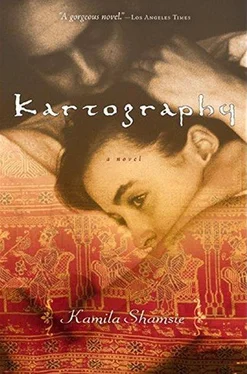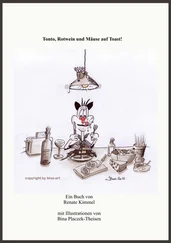I heard a plate — or was it a saucer? — placed firmly on a table, and Uncle Ali said, ‘I share Zafar’s views on land reform. And I’m not a Muhajir.’
‘Yes, but you’ve lived all those years in Karachi,’ Uncle Asif said, never losing his jolly tone. ‘It’s made you so urban. Don’t get uptight, Ali. I love Zafar, you know I do. And when the revolution comes, I’ll take refuge in his house and he’ll welcome me with open arms and guard me with his life. You, on the other hand, I’m not entirely sure about. Oh, for heaven’s sake, yaar, smile.’
‘What is it with people today and my smile?’ Uncle Ali asked. ‘Listen, Asif. Let’s put aside the old feudal argument. Tell me what’s going on in Karachi. What do your contacts in the government say?’
‘That it’s all going to hell. More tea?’
‘Asif, this isn’t a joke,’ Aunty Laila said, her voice exploding as though it had been held captive somewhere for a long time. ‘Karachi’s my home, you know. Why did those bloody Muhajirs have to go and form a political group? Once they’re united they’ll do God knows what. Demanding this, demanding that. Thinking just because they’re a majority in Karachi they can trample over everyone else. Like they did in ’47. Coming across the border thinking we should be grateful for their presence.’ I could see her shadow move across the wall as she paced across the room. ‘Do you hear the way people like Zafar and Yasmin talk about “their Karachi”? My family lived there for generations. Who the hell are these Muhajirs to pretend it’s their city!’
‘Laila, Laila,’ Uncle Ali said. ‘Do you hear yourself?’
I must have said or done something then, or maybe it was just that I was so motionless that made Karim touch my shoulder. ‘You OK?’
I nodded and pushed past him. ‘Just going to the loo.’
In the downstairs bathroom, I locked the door behind me and climbed out of the window and into the garden. Ducking low beneath window frames, I stole away from the house and sat in the dark on the swing, my hands clenched around the linked chain that moored it to the red metal frame.
What kind of immigrant is born in a city and spends his whole life there, and gets married there, and raises his daughter there? And I, an immigrant’s daughter, was an immigrant too. I had spent three weeks living in Uncle Asif and Aunty Laila’s house; I’d told her about Zia; I’d sat on his shoulder to untangle a kite from the limb of a tree. If I went back to the house and told them I agreed with my father about land reforms, if I told them Karachi was my home just as much as it was anyone else’s, would they look at me and think: another Muhajir. Immigrant. Still immigrants, though our families had crossed the border nearly four decades ago.
But worse than what Uncle Asif and Aunty Laila had said, far worse than that, was Uncle Ali’s remark: ‘I’m not a Muhajir.’ I had never stopped to think what Uncle Ali was or wasn’t. Aunty Maheen was Bengali, I knew, because every so often aunts or cousins would arrive from Bangladesh to visit, bearing gift-wrapped saris and a reminder that Aunty Maheen grew up in another language. After the relatives left, stray words of Bengali would stay clustered around her tongue, falling off in ones and twos, un-understood and untranslated. And there was another reason, also, why I knew and had known for a long time where Aunty Maheen’s family was from. I kicked at the ground and the swing jerked forward and back…
Forward and back, Zia marched up and down from the tree to the wall of the school building. I didn’t like Zia, even though he and Karim sat together in class and were friends, but I wanted to know why he was moving his arms in that strange way and clenching his little fists — he was so small he could be mistaken for a Prep-E student; not like me, the tallest girl in kindergarten, and should have been the tallest person but wasn’t because of that Ghous boy who had failed Class II and so had to repeat the year.
‘It’s marching,’ he said, when I told Karim to ask him what he was doing. ‘Because there’s going to be a war and then I’ll become a soldier.’
‘Why will you become a soldier?’ I pushed Karim aside.
‘To fight for my country. Then if I die, I’ll go to heaven. You can’t, because you’re a girl.’
‘You’re too little to fight. And I don’t want to be a soldier, so…so… Karim do you want to be a soldier?’
‘What war?’ Karim said.
‘There’ll be war with India,’ Zia said. ‘There always is. There was one only two years before we were born.’
‘That was because of Bangladesh,’ Karim said. ‘That’s where my mother’s from. She’s Bengali. That means I’m half-Bengali.’
Zia pushed. Karim. He fell over without a sound. No one knew it had happened, except the three of us.
‘Donkey!’ I yelled and kicked Zia.
‘Tell him not to lie,’ Zia yelled back. ‘He’s not Bengali, he’s not. He’s my friend. Why is he lying?’ and he raised his foot to kick Karim, raised it back and forward…
Back and forward, higher and higher, the swing hurtled me through the air and I thought, I can do this with no hands, and then I was sprawled in the dirt, the swing thudding to a halt against my shoulder blade.
It had been easy for me to ignore Zia, but Karim’s eyes kept filling with tears for the rest of the day and I didn’t quite believe it was because of the dirt he’d got in his eyes when Zia kicked him to the ground. Because it had seemed to be a big deal to Karim, I repeated Zia’s remark to my parents that afternoon. That’s when everything went a little crazy. Zia’s parents had come over, and Karim’s parents, too, and voices were raised, though I’d been told to stay in my room and so I don’t know who said what to whom and why. It was the first time I used the telephone. I called Karim and said, ‘Why are they so angry?’ and Karim said he really didn’t know, but it just felt to him like Zia had said something really bad. And then Aba and Uncle Ali and Zia’s parents all got into cars and went to Zia’s house, where they called Zia out of his room and asked him why he’d said what he’d said to Karim. Zia told us the next day that it was so strange, they all looked so strange. When Zia said he thought Bengali was a bad word, his father went straight into his room and fired his ayah. But I don’t even remember if she was the one who told me that, Zia said, and his mother yelled at him to be quiet. Talking about it made Karim and Zia friends once more, and when Zia said to me, admiringly, ‘You kick like a boy,’ instead of being angry that I’d ratted on him, I decided that maybe he wasn’t so bad after all. We never mentioned the incident again. To tell the truth, it had all seemed like a fairly minor event in our lives back when our reactions to anything more earthshattering than the rules of playground games were merely parroted versions of our parents’ attitudes, with no real understanding or conviction behind them other than the firm belief that our parents were always right.
But now, years later, I was forced to consider that Karim and I were separate in some way that seemed to matter terribly to people old enough to understand where significance lay. I wrapped my arms around the seat of the swing and rested my head on it. I was Muhajir with a trace of Pathan, and he was Bengali and… Punjabi? Sindhi? what? I considered. Probably Punjabi, I decided. He had relatives in Lahore. These days, with the Civil War treated as a long-distant memory that had nothing to do with our present lives, his Punjabiness would probably be more of an issue on the nation’s ethnic battleground than his Bengaliness. But did any of it really have anything to do with Karim and me?
Читать дальше












